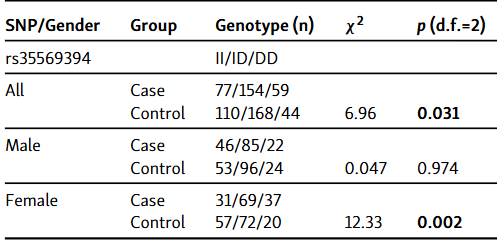Effect of vascular endothelial growth factor rs35569394 in esophageal cancer and response to chemotherapy
DOI:
https://doi.org/10.17305/bjbms.2021.5891Keywords:
Genetic polymorphism;, esophageal cancer, VEGF, angiogenesis, rs35569394, chemotherapyAbstract
The objective of this study was to investigate the possible association between the single nucleotide polymorphism (SNP), rs35569394, of the vascular endothelial growth factor gene (VEGF) and the risk of esophageal cancer (EC) in the Han Chinese population. A total of 290 EC subjects and 322 ethnically matched unrelated healthy controls free from the esophageal disease were studied. Genomic DNA was isolated from peripheral blood by salting out. Genotyping of VEGF rs35569394 polymorphism was carried out via polymerase chain reaction followed by agarose gel electrophoresis. The results showed that the distribution of genotypes was significantly different across the gender groups (p=0.032) and clinical stages (p=0.034). VEGF rs35569394 was associated with EC risk (p= 0.012, OR=1.34). A gender analysis break-down showed that rs35569394-D allele frequency was significantly higher in females than in the controls (p=0.0004, OR=1.81). Moreover, significant associations were also found in females under the dominant model (II versus ID+DD: χ2=8.18, p=0.003, OR=2.12) and the recessive model (II+ID versus DD: χ2=8.25, p=0.004, OR=2.39). Additionally, we found that the genotype, rs35569394-DD, was associated with a complete response + partial response to chemotherapy when compared with rs35569394-II (χ2=4.67, p=0.030, OR=0.47). In conclusion, our case-control study showed that the VEGF rs35569394 was significantly associated with the clinical stages and the increased risk of EC in Han Chinese females. In addition, the genotype rs35569394-DD showed a better response to chemotherapy.
Citations
Downloads

Downloads
Additional Files
Published
Issue
Section
Categories
License
Copyright (c) 2021 Zishan Wang, Chenwei Li, Xinjian Li, Jianguang Shi, Weijie Wu

This work is licensed under a Creative Commons Attribution 4.0 International License.
How to Cite
Accepted 2021-05-29
Published 2023-03-16









